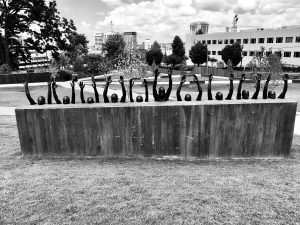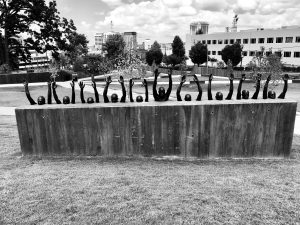
Peg claims I can only concentrate on one thing at a time, and usually it is a televised sporting event. My response is, as a wife and mother she has a biased perspective. Many women appear to easily balance a career, housework, child care and husband care or, at least, that part of husband care that involves spotting innumerable tasks that must be done right now. And COVID-19 has not assuaged the situation. In fact, social isolation has converted our intermittent contact with its mutually welcomed respites into an opportunity for constant oversight and conflict.

And while the roots of our Original Sin may go back to 1619, its most recent manifestation, the tragic death of George Floyd while in police custody, occurred during the throes of the pandemic. This has forced us to face two volatile and virulent national crises at the same time. Something we are not well equipped to do.
As with most problems we can seek guidance from the wisdom of those upon whose shoulders we stand. When many Americans were totally disheartened by the Great Depression President Franklin Roosevelt told us on March 04, 1933: “Our greatest task is to put people to work … and accomplish greatly needed projects.”

The State of Oklahoma enshrined the state seal with the motto: Labor omnia vincit (work conquers all). When confusion and despair threaten us, our collective wisdom directs us to roll up our sleeves and get to work.
I would like to point out to Peg that I see two major tasks to be done: (1) recover economically from COVID-19; and (2) use the protest demonstrations to positive good. My suggested answer to both is to co-opt FDR’s approach and meld it with the trillions of dollars and work hours our governments at all levels are making available to individuals and businesses.
Every locality has needs that are best identified by the people who actually live in each area. Individuals and families need jobs, businesses need workers and the public needs projects completed, such as educating and training children and adults and construction of public assets: dams; roads; medical facilities; and utilities, etc.. People who have lost their jobs need to be re-trained as welders, nurses, farm hands and technicians.
Instead of providing short-term financial help we can set up mobile employment offices where civil rights demonstrations are already taking place and offer job skills training and immediate employment. It is better to teach fishing than dole out a few fish for a few months. We can invest in ourselves as Wall Street does, for the long haul. Capitalism is a system that works. We can use it to address our economic problem and by creating hope and incentive we can get those who have been left behind on the road to social justice.
So there, Peg. Now leave me alone and let me watch a replay of the Tiger Woods/Payton Manning golf match against Phil Michelson and Tom Brady.





 Woody Guthrie (Woodrow Wilson Guthrie 1912-1967) came of age in the Dust Bowl during the Great Depression. When one hears Woody sing about the America of those times Guthrie’s personal experiences and perceptions should be considered. In that context, his song’s ironic lyrics that point out America might not have been made for everybody speak to those Americans left out by our Founding Fathers, who were all well-to-do white men.
Woody Guthrie (Woodrow Wilson Guthrie 1912-1967) came of age in the Dust Bowl during the Great Depression. When one hears Woody sing about the America of those times Guthrie’s personal experiences and perceptions should be considered. In that context, his song’s ironic lyrics that point out America might not have been made for everybody speak to those Americans left out by our Founding Fathers, who were all well-to-do white men.